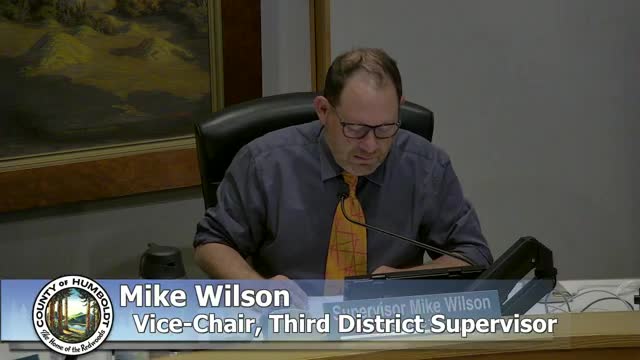Board debates Measure S options as growers press for permanent repeal
Get AI-powered insights, summaries, and transcripts
Subscribe
Summary
Facing $11.45 million in past-due Measure S balances and plummeting cultivation tax revenue, county staff presented options to the Board of Supervisors: repeal the cultivation excise immediately or hire a consultant to design a replacement tax. Growers urged prompt repeal.
Humboldt County staff briefed the Board of Supervisors on Oct. 28 about sharp declines in Measure S cannabis cultivation-tax receipts and growing past-due balances, prompting a heated discussion and a board motion to pursue repeal.
Deputy CAO Sean Quincy summarized the fiscal picture: Measure S revenue peaked during early implementation years but has declined dramatically amid a statewide oversupply of cannabis and falling wholesale prices. Quincy reported $11,450,000 in past-due Measure S balances and said the county had collected just over $570,000 of roughly $1.63 million billed for the 2024 cultivation cycle (about a 35% collection rate).
Staff presented two primary options: (1) repeal Measure S entirely, which would eliminate the county'specific cultivation excise and remove an administrative burden from staff and growers, or (2) pay a consultant (HDL) to study alternate tax structures (for example, switching from a square-foot cultivation charge to a gross-receipts model or adjusting rates by operation type) and return with an analysis and draft ordinance. Staff estimated the consultant study would cost up to $52,800 and could support a ballot measure if the board chose to pursue a new tax.
Growers, farm associations and consultants dominated public comment in favor of repeal. Marissa Corey of ETA Management Group and other callers said farms cannot bear further specialized cannabis taxation and urged immediate repeal. Several board members said the market and regulatory environment has changed since Measure S was adopted in 2016 and that repeal would provide business certainty. During discussion supervisors raised procedural questions about drafting ordinance language and how any outstanding past-due balances would be handled. The board debated whether to direct staff to bring back an ordinance that would set the Measure S tax rate to zero (effectively repealing it) or to fund a consultant study.
Near the end of the public debate a motion was made directing staff to proceed with drafting repeal language; discussion continued and the meeting recessed into closed session before a final roll-call vote on that specific motion was recorded on the public live transcript. Counsel later advised that an ordinance to set the county'level measure to zero would remove the tax but a future board could still reinstate a county measure unless the voters took a separate action to forbid it.
